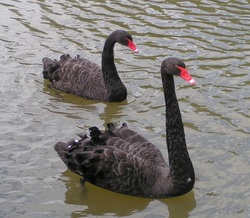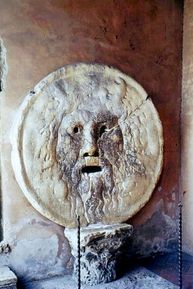 Black swans are Wikymedia Commons
Black swans are Wikymedia Commons “The reasonable man adapts himself to the world: the unreasonable one persists in trying to adapt the world to himself. Therefore all progress depends on the unreasonable man.” [1] Remember Shaw’s contrarian saying before you rush to discard the workings of the fools.
Goodness can be born from error, the right thing done for wrong reasons and truth may come from the mouth of the innocent and even of the liars. False premises can result, logically, in true conclusions.
Some errors are even useful, without them there would be no unexpected change, unplanned learning or growing experience. Some things must go worse before they can to go better. Particularly, in conflict, do not stop wrong people while they do errors. For you, they are useful.
Be wise instead of growing mad in the name of some fanatic error-slaying God of Truth who wants to be the only god, the unique human judge. Let errors be for a moment, long enough to understand them before rejecting or correcting them, so that you may learn something useful from them. Reckon errors by their importance, merit and consequences, as it is reasonable, not by their source nor simply for the crime of being an error. Look at the billiards not at the cue.
More than rejecting error out of hand, you can learn to use error as you use truth; with a light hand and time given, you can learn to turn an error or a bad thing that befell, into a good thing, or at least make people learn something. In truth, the wise, as Cato the Censor said [2] can profit more from the fools than the fools from the wise.
For this, instead of rushing righteously to exclaim “Aha, this is an error!” "I caught you!" tell yourself “Whatever this may be, let me see what good can be drawn out of it?”
As one of my professors used to say, facts are friendly. Whatever they are, it is of no use to fight them instead of being content to know them so that you can respond properly or even build something on them instead of trying to force them to fit what you expected, or worse, some ideal of how things must be.
[1] Shaw, G.B. Man and superman; A Comedy and a Philosophy, Archibald Constable & Co., Ltd., Westminster, 1903.p. 238
[2] Cato the Elder (Marcus Porcius Cato (234 BC - 149 BC): "The wise men learn more from the fools than fools from the wise; for the wise avoid the eror of the fools, wile fools do not profit by the example of the wise." Plutarch's Lives, Volume 2 (Cato the Censor), Hickman and Hazzard, Philadelphia, 1822

 RSS Feed
RSS Feed